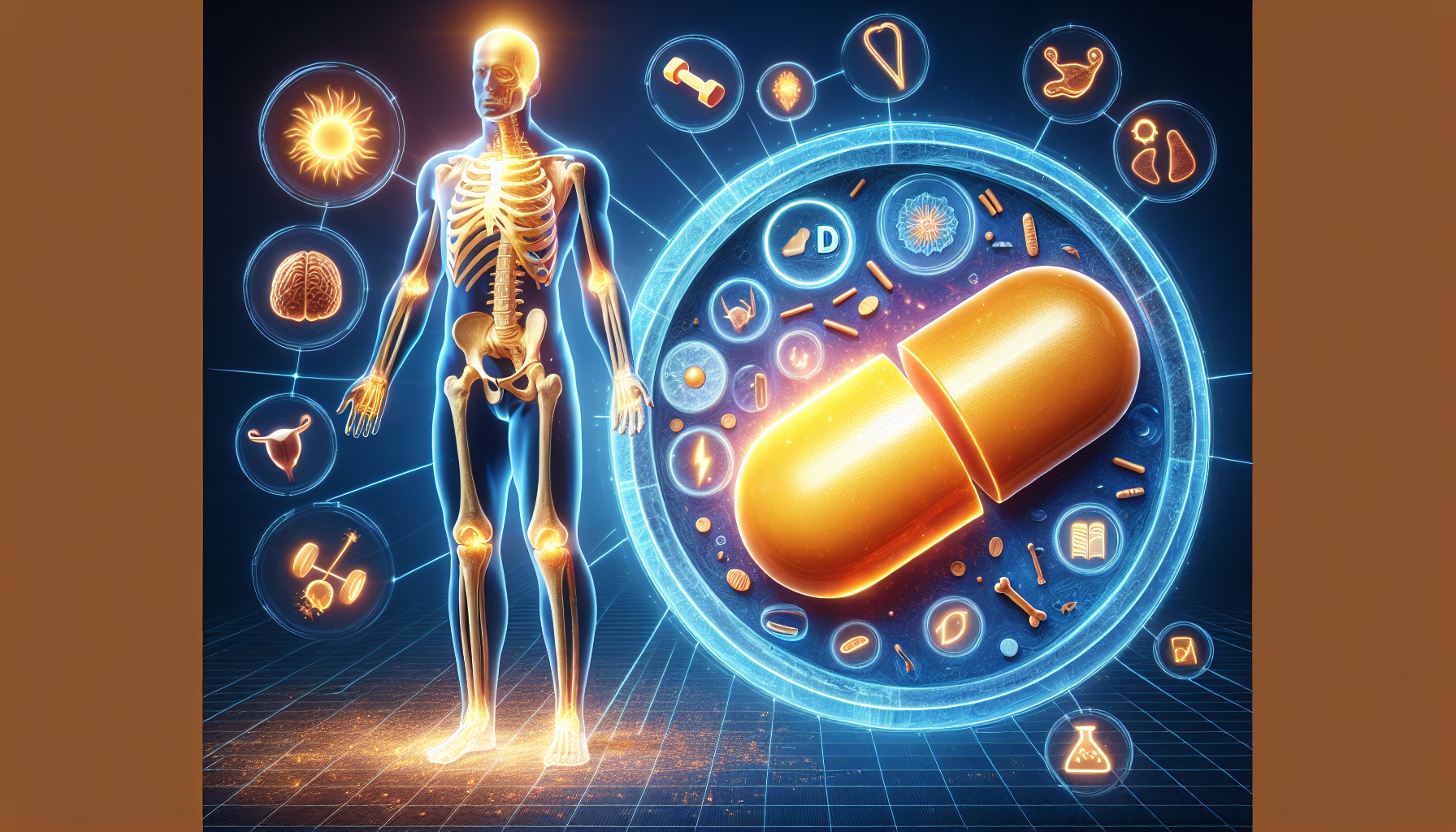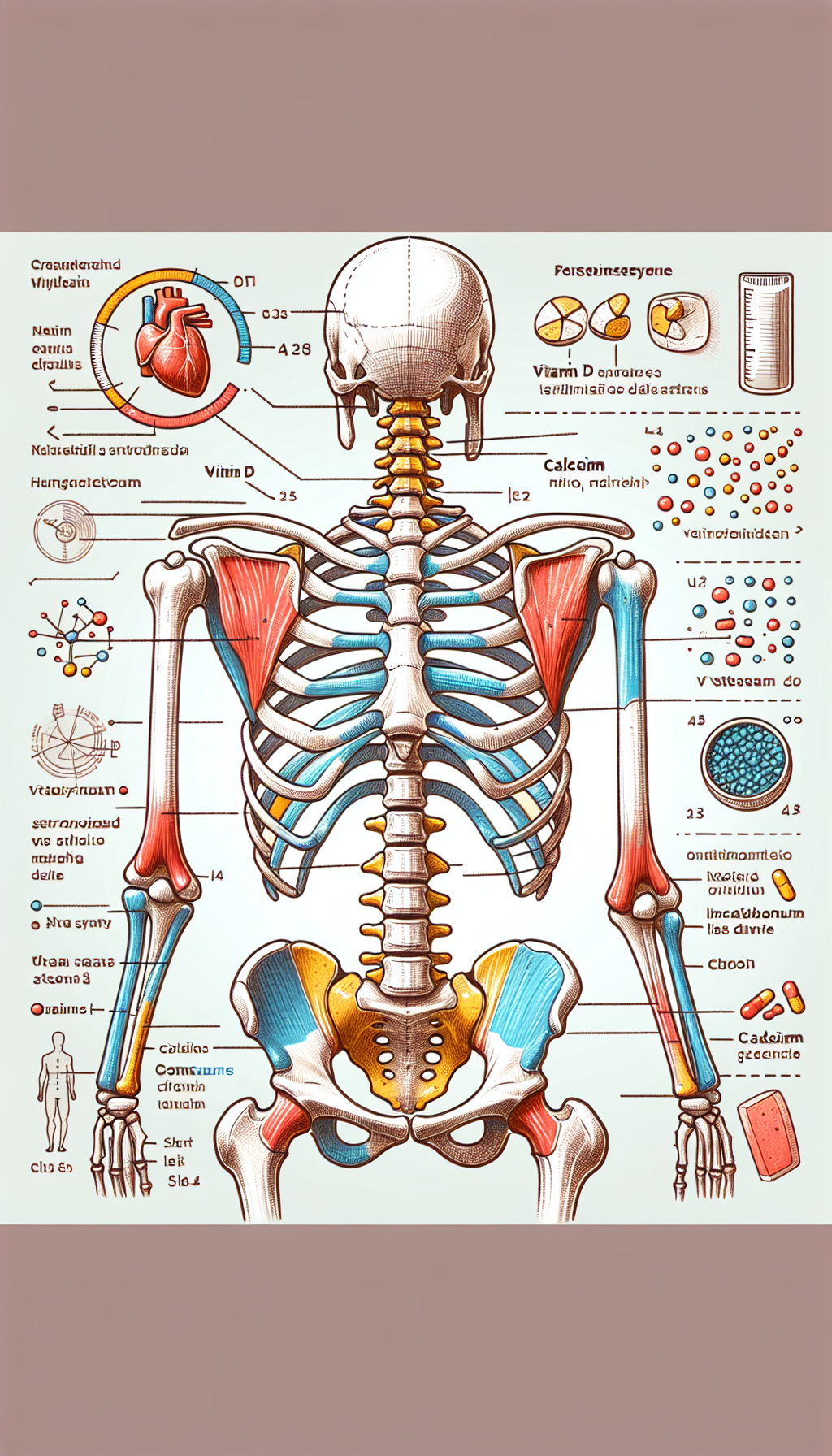Vitamin D, often hailed as the sunshine vitamin, is critical for maintaining strong bones and optimal calcium utilization. It is a fat-soluble vitamin that is naturally present in very few foods, added to others, and available as a dietary supplement. Moreover, it is produced endogenously when ultraviolet rays from sunlight strike the skin and trigger vitamin D synthesis. This article delves into the intricate relationship between vitamin D and bone health, underscores the importance of calcium, and provides practical guidance on how to maintain bone health through lifestyle choices and nutrition.
Understanding the Role of Vitamin D in Bone Health
Vitamin D plays a pivotal role in calcium absorption in the gut and maintains adequate serum calcium and phosphate concentrations to enable normal mineralization of bone. Without sufficient vitamin D, bones can become thin, brittle, or misshapen. Vitamin D sufficiency prevents rickets in children and, together with calcium, helps protect older adults from osteoporosis.
Calcium: The Building Block of Bones
Calcium is the most abundant mineral in the body and is essential for building and maintaining strong bones. Throughout your lifetime, your body continually reabsorbs old bone tissue and forms new bone. During childhood and adolescence, new bone is added faster than old bone is removed, which increases bone mass. As people age, bone mass is lost faster than it’s created.
Enhancing Calcium Absorption with Vitamin D
The body’s ability to absorb calcium is significantly enhanced by vitamin D. Without it, your body would only absorb 10-15% of dietary calcium, but with an adequate level of vitamin D, absorption doubles or even triples. This synergy between vitamin D and calcium is essential for maintaining bone density and strength, particularly as you age. For more details on bone health, visit Avix Health’s comprehensive guide.
Factors Affecting Vitamin D Levels
Several factors can affect your vitamin D levels. Limited exposure to sunlight, particularly during the winter months, can lead to a deficiency. Furthermore, as you age, your skin’s ability to produce vitamin D diminishes. Certain medical conditions, such as Crohn’s disease, cystic fibrosis, and celiac disease, can affect your intestine’s ability to absorb vitamin D from the food you eat. Additionally, obesity can cause a lower bioavailability of vitamin D.
Sources of Vitamin D
To boost vitamin D levels, you can expose your skin to sunlight, consume foods rich in vitamin D, or take vitamin D supplements. Fatty fish like salmon, trout, mackerel, and tuna are excellent natural sources. In addition, mushrooms exposed to ultraviolet light, fortified foods like milk, orange juice, and cereals, as well as egg yolks, provide some vitamin D.
The Consequences of Vitamin D Deficiency
A deficiency in vitamin D can lead to bone abnormalities such as osteomalacia (softening of the bones) or osteoporosis (reduced bone density and quality). Low bone density can increase the risk of fractures and may result in chronic pain and disability. To understand the significance of bone density in health, explore the insights on bone density and athletic performance.
Monitoring and Managing Vitamin D Levels
Maintaining appropriate vitamin D levels is key for bone health. Regular check-ups and screenings can help monitor these levels. In cases of deficiency, a healthcare provider may recommend supplements. It’s important to note that while vitamin D is essential, excessive intake can lead to adverse health effects.
Additional Strategies for Bone Health
While vitamin D and calcium are central to bone health, other factors also contribute. Weight management, exercise, and a balanced diet play significant roles. Weight-bearing exercises, such as walking, jogging, and weight training can help build and maintain bone density. A diet that includes a variety of nutrients, particularly potassium and vitamin C, supports bone health. For a deeper understanding of these contributions, read about potassium’s role in bone health.
External Resources for Further Reading
- The National Osteoporosis Foundation provides detailed information on the role of calcium in preventing osteoporosis and the importance of vitamin D.
- The Vitamin D Council is a valuable resource for understanding how vitamin D works and its effects on the body.
- For those interested in the science behind bone remodeling and the role of nutrients, the Linus Pauling Institute offers an in-depth look at micronutrients and bone health.
Conclusion
Vitamin D is essential for bone health and effective calcium utilization. It helps maintain bone density and strength, which are vital for overall well-being. Adequate intake through diet, supplements, and sensible sun exposure, along with a healthy lifestyle, can help ensure your bones remain strong throughout your life. Regular screenings and consultations with healthcare providers can aid in monitoring vitamin D levels and maintaining bone health, which is a cornerstone of a vibrant, active life.
For more information on bone health and related topics, please explore the wealth of resources available on Avix Health.



